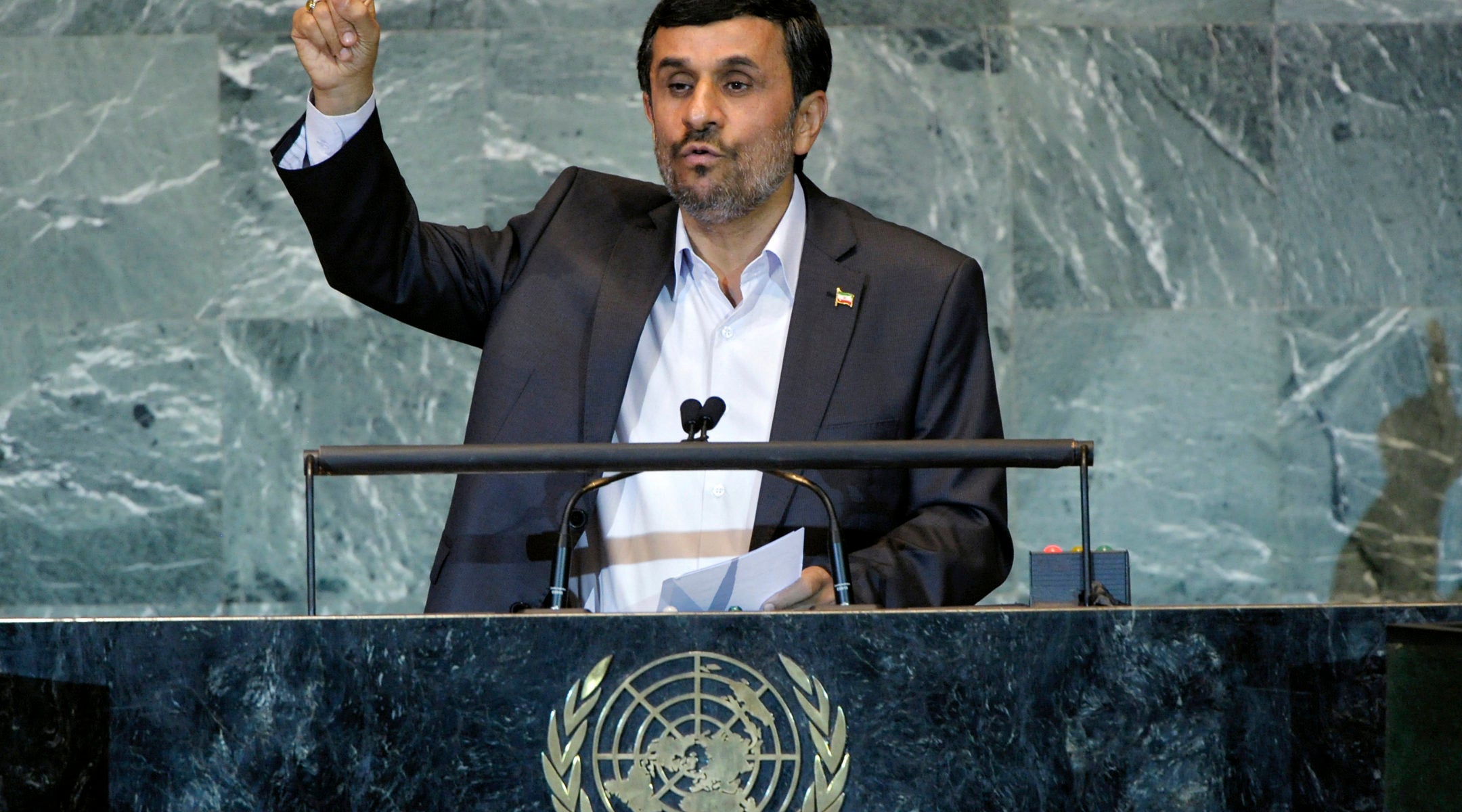WASHINGTON (JTA) — At this year’s U.N. General Assembly, Iran’s push for nuclear weapons is the overwhelming international diplomacy priority for American Jewish groups — but it’s not the only one.
The body’s 67th session, which opened Sept. 18, provides the opportunity for Jewish groups to meet with the retinue of presidents, foreign ministers and other policymakers who arrive in New York City for its opening session.
“Obviously Iran is No. 1, 2 and 3 on the agenda,” said Malcolm Hoenlein, executive vice president of the Conference of Presidents of Major American Jewish organizations.
However, Iran’s nuclear aspirations are not the only item with that country, adds Daniel Mariaschin, executive vice president of B’nai B’rith International. In meetings with diplomats, he will press not only on Tehran’s nuclear pursuits but also its domestic human rights abuses as well as support for international terror and Syria’s repressive Assad government.
“This is a regime that has a bloody record wherever you look,” he said.
Other top issues for American Jewish groups include the Palestinian push for non-member state status, anti-Semitism in Venezuela, the efforts of some European countries to ban religious ritual circumcision and kosher slaughter, Holocaust restitution claims and urging the European Union to place Hezbollah on its list of terrorist groups.
In recent months Israeli officials have been speaking publicly about how international sanctions against Iran are not working quickly enough. Israeli Prime Minister Benjamin Netanyahu has hinted that that a preemptive military strike is needed to set back the effort.
“The bottom line is they’re still moving forward” with the nuclear program “and the can keeps getting kicked down the road,” said Michael Salberg, the Anti-Defamation League’s director of international affairs. “Well, we’re coming to a cul-de-sac in that road.”
Salberg said the ADL will push in its meetings with diplomats for clarity on “what time and space for diplomacy and sanctions really means.”
Iranian President Mahmoud Ahmadinejad is scheduled to address the General Assembly on Wednesday, but Jewish response will be delayed because he is speaking on Yom Kippur. Netanyahu is slated to speak to the world body the next day.
On Monday, political, Jewish and other leaders are planning to be on hand for an 11 a.m. news conference to denounce Ahmadinejad’s appearance at the United Nations. Ahmadinejad has called Israel “a cancerous tumor.”
“We’re not saying he doesn’t have the legal right to be here, but we’re saying let the world know how offensive he is and what he stands for,” said Hindy Poupko, director of Israel and international affairs at the Jewish Community Relations Council of New York.
The New York JCRC runs Iran 180, which is coordinating the news conference. The effort is dedicated to demanding, as the group puts it, “a 180 by the Iranian government on their pursuit of nuclear weapons and the treatment of their citizens.”
Iran 180 also is visiting area college campuses with its #UNwelcome campaign, which includes a large effigy of Ahmadinejad. Students are urged to handcuff themselves to the puppet and disseminate photos of it on social media sites.
Ahmadinejad’s visit is prompting other Jewish activism as well.
On Wednesday, the Shurat HaDin Israel Law Center filed a motion in U.S. District Court in Manhattan demanding that the Warwick Hotel, where Ahmadinejad is staying, deny the Iranian leader a room. In a statement, the group said the room should be given to Stuart Hersh, a Shurat HaDin client still owed a $12 million judgment against Iran after he was injured in a 1997 Hamas suicide bombing in Jerusalem.
Hoenlein also hopes to draw attention to the plight of some 800,000 Jews who lived in Arab countries at the time of Israel’s founding in 1948 and subsequently fled their homes. A program at the U.N. on Monday on the topic drew about 300 people, including a number of ambassadors and other diplomats, he said.
“We think history is not competitive and acknowledging the truth of others’ history doesn’t denigrate yours; there’s no reason to oppose this,” Hoenlein told JTA. One effort, he said, will be to ask the U.N. to establish a documentation center on the plight of the Jewish refugees.
There also will be a push to end U.N.-sponsored groups considered hostile to Israel, such as the Committee for the Exercise of the Inalienable Rights of the Palestinian People.
“We could go through a list of people looking for statehood, but only for the Palestinians do they have this special arrangement,” Mariaschin said. “They have conferences, photo exhibits, publications and it’s time to shut that down.”
Mariaschin said such efforts only delay Arab-Israeli peacemaking due to their biased message.
Also on the mind of Jewish groups in their meetings will be the efforts of some courts and legislators to ban Jewish ritual circumcision and kosher slaughter of animals.
Earlier this year, in a ruling that outraged Jewish and Muslim groups, a court in Cologne, Germany, said that a non-medical circumcision of a minor was a criminal offense. Germany’s government has spoken out against the law and is working on legislation to counter it. The state of Berlin passed a law affirming the legality of circumcision but restricting its exercise to doctors.
Several other European countries, including Holland, have seen efforts to ban shechitah, kosher ritual slaughter, due to claims that it creates unnecessary suffering for the animals.
If governments are “serious about the strength of democracy, freedom of religion has to be a foundational principle,” Salberg said, “and efforts to ban ritual circumcision and slaughter violate that fundamental right.”
JTA has documented Jewish history in real-time for over a century. Keep our journalism strong by joining us in supporting independent, award-winning reporting.






